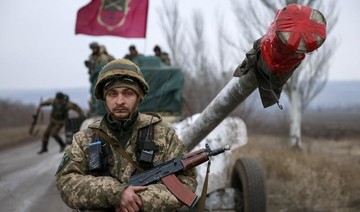MANILA: Philippine President Rodrigo Duterte on Friday announced that 20 million of the country’s poorest citizens will receive free COVID-19 vaccines, which he hoped would happen by December.
The announcement came during Duterte’s address to the nation where he also spoke about the country’s planned “return to normal” by the end of the year, even though like the rest of the world it is still grappling with the coronavirus pandemic.
“I promise you, by the grace of God, I hope by December we will be back to normal. Don’t mind the new normal because as I told you from the start, let’s just wait for a vaccine,” Duterte said. “Just wait till December ... We are not going back to a ‘new normal.’ It’s going to be normal again,” he added.
Finance Secretary Carlos Dominguez, who was among the Cabinet members present during the president’s address, said that the government could finance the procurement of 40 million doses of the vaccine, estimated to cost about 20 billion pesos ($400 million).
“We have a financing plan for that. The Department of Health (DoH) estimates that we will need to vaccinate for free a minimum of 20 million people. I don’t know if it’s one vaccine or two shots. So we need 40 million doses; 40 million times $10 per dose is $400 million or roughly 20 billion pesos,” Dominguez said.
“We have a plan and we can execute it as soon as the DoH chooses which vaccine or vaccines they want. Certainly, by late this year, if it’s available, we can already buy it,” he said.
According to Duterte, the first COVID-19 vaccine may come from China, where the disease had originated. He mentioned China’s Sinovac Biotech and Sinopharm Biotech as potential sources of the vaccine.
HIGHLIGHT
President Duterte said the Philippines would be given priority in supplies if China makes a breakthrough with a COVID-19 vaccine.
He cited friendly bilateral ties with China and said that Beijing had “guaranteed” that it would give priority to the Philippines once the vaccine was ready. Besides the poor, Duterte said, the military and police would also be among the first to receive the vaccine.
Drug pushers, whom he called “dogs,” would not be vaccinated.
“I see drug pushers, drug addicts as dogs. I will not help you. You are destroying the Philippines, you are killing people,” he said.
The president also announced that Metro Manila would remain under general community quarantine (GCQ) as the number of COVID-19 cases continues to rise.
Other areas under GCQ are: Cebu City, Bulacan, Batangas, Cavite, Laguna, and Rizal in Luzon; Lapu-Lapu City, Mandaue City, Talisay City, Minglanilla and Consolacion in the Visayas; and Zamboanga City in Mindanao.
On Friday, the DoH reported a record high of 4,063 new COVID-19 infections, bringing the total coronavirus figures in the country to 93,354, of which 26,153 are active cases.
The Philippines’ coronavirus death toll has reached 2,023 after 40 more patients were reported to have died from the disease.



























